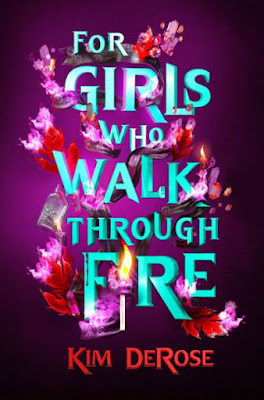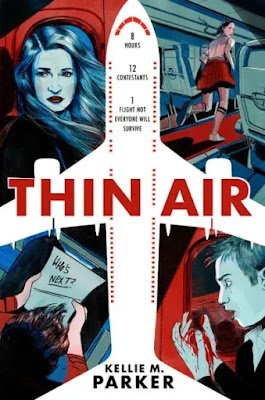Kim DeRose writes dark, magical stories about strong, magical girls.

She grew up in Santa Barbara, California, where she spent childhood summers reading books and writing stories (which she was convinced her local bookstore would publish). She now lives in New York City, where she spends all seasons reading books and writing stories.
DeRose earned her MFA in film directing from UCLA, and currently works in digital media.
When she’s not reading or writing she can be found listening to podcasts on long walks, drinking endless cups of coffee, and spending time with her family.
For Girls Who Walk Through Fire is her debut novel.
My Q&A with the author:
How much work does your title do to take readers into the story?
I think my title, For Girls Who Walk Through Fire, does a very good job at taking readers to the core of the story. These girls have been through something, they have walked through fire. And it simultaneously does a good job of alluding to the witches and witchcraft featured in the story because, as we know, so many women were labeled witches and burned at the stake. And yet the teen witches in my novel aren’t about to adhere to that narrative, these witches are fighting back. What I also love about the title is that it’s as much about my characters as it is about the readers. In fact, the book is partially dedicated to anyone who has walked through fire.
How surprised would your teenage reader self be by your new novel?
Oh, I think she would be very surprised, but pleasantly so. Taking a step back, I think my teenage self would also be incredibly surprised that I’d written and published a novel to begin with. Becoming an author was my childhood dream, but by the time I was a teenager I had abandoned it, believing it to be unrealistic. It took me a very long time to circle back around and remember what I’d known as a kid: that I am a writer.
I think my teenage self would also be very surprised by the serious subject matter of the book. If she was able to read For Girls Who Walk Through Fire, I think it would open her eyes and make her think about her own experiences and the experiences of her friends quite differently. I think it would help her to stop minimizing things that happen to her, and all around her, and stop considering them “normal” or “just what girls have to put up with” or “the way guys are.” I think this book would help her see that all of these experiences really are that bad, and that they all flow out of the same misogynistic rape culture.
Do you find it harder to write beginnings or endings? Which do you change more?
With this novel I found both the beginning and the ending to be rather easy to write, which isn’t always the case. But I knew exactly where I wanted For Girls Who Walk Through Fire to begin - with Elliott sitting in her sexual assault support group - and I knew exactly where and how I wanted it to end (which you’ll have to read to find out!). Neither of those changed very much. In general, however, beginnings are harder for me to write and are often what I revise several times. There’s a lot to introduce and set up quickly, and to do so in a way that feels natural and engaging can be tricky.
Do you see much of yourself in your characters? Do they have any connection to your personality, or are they a world apart?
Yes, I definitely see aspects of myself in my characters. I wouldn’t say that any of them are auto biographical by any means, but there are parts of me in all of them. Elliott and Madeline are probably most like me in very different ways. Elliott is very much who I internally was as a teen and wished I could have been externally. And Madeline is a much more extreme and driven version of who I was socialized to be as a teen. But there are also parts of me in both Chloe and Bea, as well as in Mary, Elliott’s mom and dad, and in Otis.
I often think about what my documentary professor told us in graduate film school: that every documentary is a portrait of the artist. I think that’s true for books as well. It isn’t that a particular character or set of characters is you, the writer, it’s more that the entire book is filtered through your perspective  and a reflection of you (which means it will also reflect your limitations). It’s your lens on the world in that particular moment.
and a reflection of you (which means it will also reflect your limitations). It’s your lens on the world in that particular moment.
What non-literary inspirations have influenced your writing?
I have a ton of non-literary influences.
Music is a huge part of my writing process, so I’m always listening to music when I write, and it varies quite a bit depending on the book or even the chapter or scene that I’m working on.
I’m also a huge film lover (and, as mentioned above, went to graduate film school) so I’m very inspired by a variety of filmmakers. I have too many to name here, but I will call out my deep ongoing love of all things David Lynch. I love his exploration of whiteness and the dark underbelly of suburban life.
I’m also a big podcast listener and there are a lot of intersectional feminist ideas, progressive conversations, and creative explorations within podcasts that have been very influential on my thinking and writing. Of note is We Can Do Hard Things with Glennon Doyle, Amanda Doyle and Abby Wambach, The Roxane Gay Agenda, The Laverne Cox Show, Call Your Girlfriend with Ann Friedman and Aminatou Sow, Still Processing with J Wortham and Wesley Morris, Unlocking Us with Brené Brown, Wiser Than Me with Julia Louis Dreyfus, and Forever35 with Doree Shafrir and Kate Spencer.
Visit
Kim DeRose's website.
--Marshal Zeringue
 adrenaline-pumping world of live TV. Like her protagonist, she chased marquee athletes through the tunnels of Madison Square Garden and stood before glaring lights reporting to national audiences.
adrenaline-pumping world of live TV. Like her protagonist, she chased marquee athletes through the tunnels of Madison Square Garden and stood before glaring lights reporting to national audiences.
“Martin” which I pronounced Mar-den.” Then I thought–why would I do that to myself? So I changed my protagonist’s name to Kate Green!










